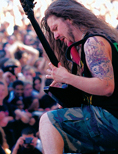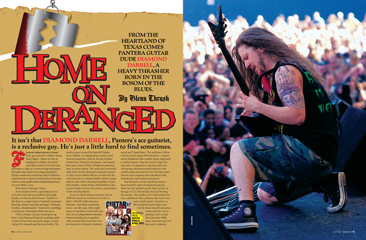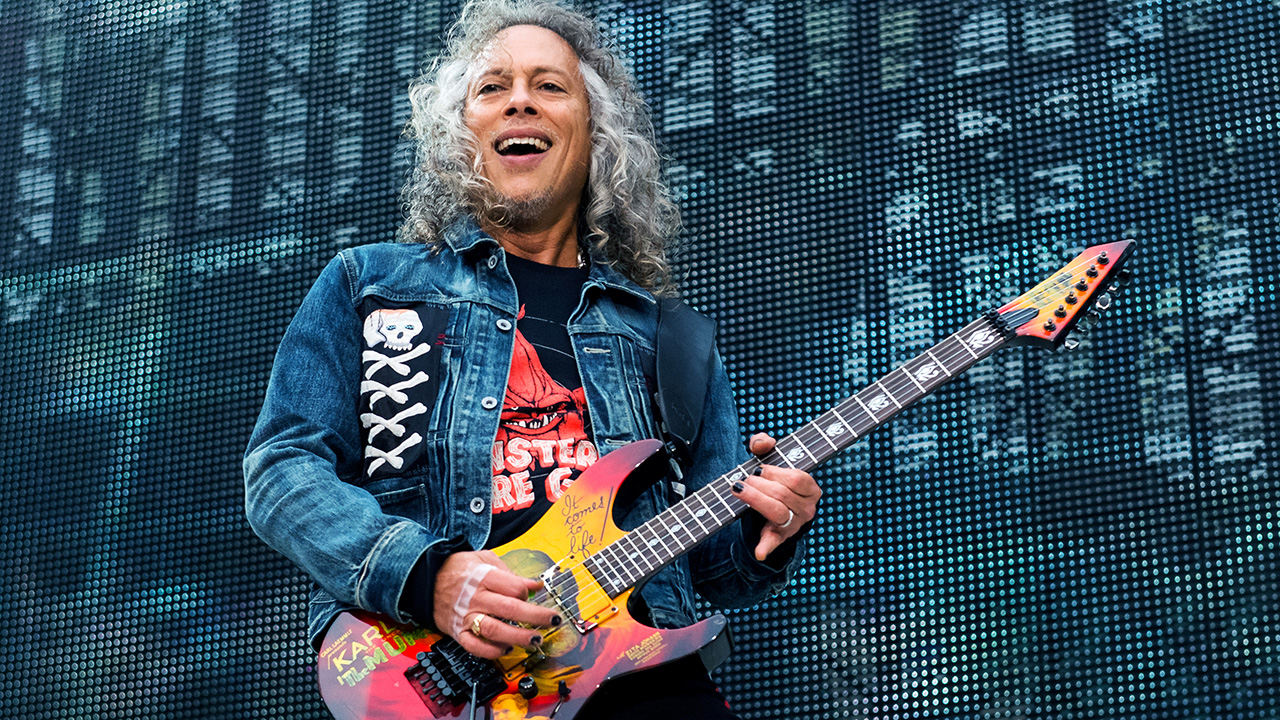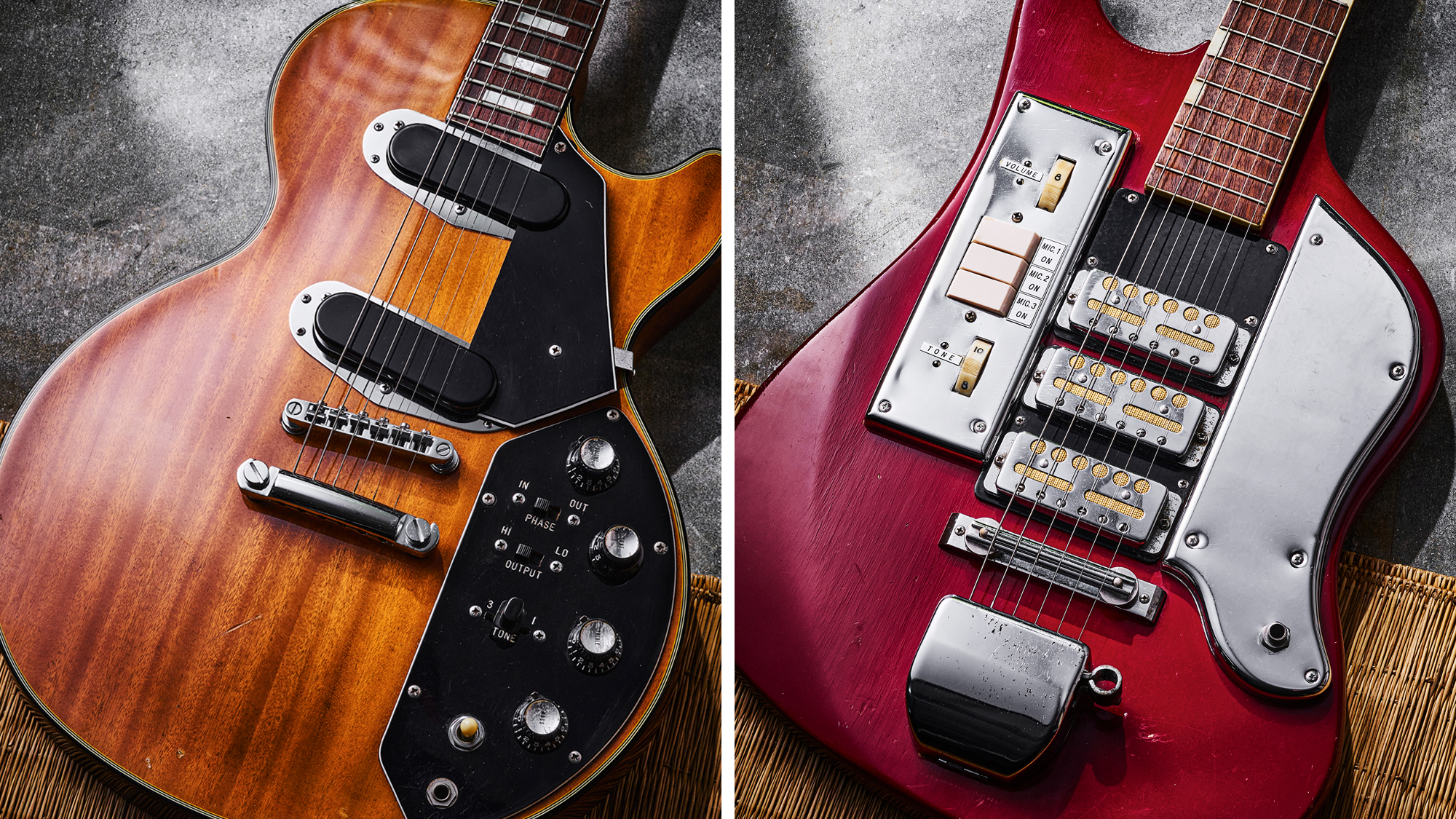Dimebag Darrell: Home of Deranged


From the heartland of Texas comes Pantera guitar dude Diamond Darrell, a heavy thrasher born in the bosom of the blues.
It isn’t that Diamond Darrell, Pantera’s ace guitarist, is a reclusive guy. He’s just a little hard to find sometimes.
Follow these instructions: First, get yourself to Dallas, Texas. Don’t linger—there are lots of handguns in Dallas. Travel 20- odd miles south on the toll road, and make a right on a narrow strip that passes through what used to be a huge plantation. Climb a small rise crested by Luby’s Cafeteria, and head into a maze of truck paths in the lonesomest, most godforsaken industrial park you are ever likely to see.
Welcome to Pantego, Texas.
Just outside of town, squatting in a sea of scrub weed and rain-faded Coors Light bottles, is a brown block house. Tacked on the door is a single sheet of spoiled notepaper bearing a faded, penciled message: “Pantego Studios, closed session.” Some low rumblings reverberate ominously behind the door.
“This is home, I pretty much grew up here,” says Diamond Darrell, pushing aside a stack of fan mail and girlie mags to clear a place for himself and his beer bottle. The studio is part-owned by Darrell’s father, Jerry Abbott, an independent country and western producer. Darrell, his big brother Vinnie Paul, Pantera’s drummer, and bassist Rex spent most of their childhood jamming here in Jerry’s place. The walls are festooned with relics of two divergent musical careers: A Gold record which Abbott received for his contribution to a Jimmy Buffett album hangs side-by-side with a Xeroxed snapshot of Darrell’s buddy, Judas Priest’s Rob Halford, flexing his biceps in front of a cactus, somewhere in the Arizona desert.
It was in these homey environs that in 1990 the band cut Cowboys from Hell, a killer 140,000-seller that put Pantera—and their namesake town—on the map. After eight years of thankless road work and four so-so independent releases, Pantera finally put it together with a sound that fused the rawest elements of thrash, hardcore, metal and Texas blues. The addition of New Orleans–bred singer Phil Anselmo—a hyperactive skinhead with a roller-derby approach to performance—has the band’s stage-diving cadre of supporters arguing with ever-increasing vehemence that Pantera is the world’s most raucous live act. For their part, Darrell and company have the Band-Aids, busted gear and bruises to prove it.
Get The Pick Newsletter
All the latest guitar news, interviews, lessons, reviews, deals and more, direct to your inbox!
But the heart of the band has always been Darrell’s tight disciplined playing. Since he first picked up his dad’s guitar at the age of 13, Darrell has been perfecting his sound—the product of a bottomless bottom combined with a clarion-like lead tone and a blues man’s attention to the sound of each single note. On the road, Darrell’s presence transcends his role as guitarist. He’s a certified Lone Star Wildman, with burning-coal eyes and a crimson- stained fu-manchu moustache and beard. As one nervous management-type associated with the band apprehensively admits, “It’s a little scary sometimes. You never know what the hell this guy’s going to do next.” Which is to say that he likes partying hard and getting in people’s faces—especially mugs belonging to metal’s most self-important superstars.
Earlier last year, after returning from a long European tour opening for Judas Priest—which culminated in a dream gig with Metallica, AC/DC and the Black Crowes before 750,000 Muscovites—the band cut a new album that pretty well reflects their worldview: Vulgar Display of Power.
But success has wrought changes in Pantego. The loving Abbott boys are using their newly acquired clout to help their father achieve his dream of setting up a studio in Nashville. Unfortunately, the move means that Darrell and Vinnie will have to abandon the studio that has been their playhouse and music factory since childhood.
And there’s another change, one very close to Darrell’s heart.
“Listen,” says the 25-year-old guitarist. “People have been calling me Diamond Darrell for too long. It’s a mistake. I’ve always been called Dimebag Darrell by my friends. That’s my real name. Dimebag Darrell—got it?” So it is commanded, so it shall be done.
*****
GUITAR WORLD You’re the kind of guy who needs a guitar that can take a lot of abuse. Is that why you play those old Deans?
DIMEBAG DARRELL Yep. I just love ’em.
GW Dean has been out of business for several years. How do you get your guitars?
DARRELL I get them with these eagle eyes—I keep ’em peeled for them bad boys. Any town, anytime, anywhere I see a pawnshop, I go in, dude. I find the Deans everywhere. I bought the last one out on the road for $150. I couldn’t believe it—not a scratch on it. Everything was original on the thing, even the pickups. Of course, I changed those real quick.
GW Just what do you do to your guitars?
DARRELL The first thing I do with any guitar I find is to Floyd Rose it immediately, and then I install a Bill Lawrence L-500-L pickup. In many ways, the Bill Lawrence is really the key to my sound; it’s a killer pickup. On the treble strings, it’s a real bitch—sounds almost like you’re running a CryBaby with the pedal pushed down a bit. It gives you that clear harmonic tone—you get a little bit of a pick squeal every time you hit a note up there. And, of course, it’s real thick and chunky on the low strings.
Anyhow, after I get the Lawrence in, I flip it upside down, so that the hot pole, instead of being in the treble position, is in the front rather than near the bridge. It’s totally thick and chunky. It sounds good the other way too, but it’s a little too squirmy for me. Lately, I’ve been using a Lawrence L-500-XL, which is an even hotter pickup.
GW Your sound is very distinctive, very personal—I recently heard a reference to a “Darrell” tone. How do you get it, aside from the pickups?
DARRELL It’s funny, because in the studio we spend 20 minutes on the guitar tone, tops. Nothing too complicated, dude. That’s my sound, period. When I play a lead live, I don’t have my guitar tech do anything other than open the gate. That’s it. I don’t have a special “lead” tone. I don’t boost anything; the pickups are always in the treble position.
I’d say that my tone is mostly the product of the Randall amps I use. I don’t have a clue why people say I’m one of the few dudes who can get a good sound out of a Randall. Jesus, I can take any guitar, plug into any Randall and get really close to my tone.
The problem is that people expect to just plug into an amp and be blown away, so they buy themselves a Les Paul and a Marshall. That’s the easy way out, dude. I won a Randall half-stack six or seven years ago in a guitar contest. It was a little nasty sounding, a little gritty, but I liked it. I knew that with time I could make it my own sound, and it came around.
GW What effects do you juice your amps with?
DARRELL It’s pretty simple, actually. I run my guitar out into a Furman PQ-4, MXR Blue six-band EQ, into my Rocktron Hush 2-B noise gate, and into the amps. And that’s about it.
Oh jeez, I forgot the Dunlop CryBaby— wah’s the last thing between the gate and the amp, so it gets all that gain pulsing through it. I run all my leads on the albums through a wah, and just set it where I think it’s hot and leave it alone. I don’t do that when we’re live.
GW Reliable rumors have it that your European tour with Judas Priest was less than enormously successful.
DARRELL It wasn’t a total disappointment, but there were problems. The album didn’t come out until we were on tour for a week, so nobody had really heard of us. We got to know Rob Halford really well, though. He’s a great guy; he did “Beyond the Realms of Death” with us. Awesome.
GW What was it to play in front of nearly a million people in Russia?
DARRELL I can’t even describe it, it hasn’t sunk in yet. But it has already saved our butts once. We were out in front of the studio, twisting and hurling beer bottles at the stop sign, when these cops came from nowhere and start giving us the third degree. So Phil turns to ’em and says, “I know I got tattoos and no hair, but we’re an honest band.” He looks at the head cop and says real seriously, “Officer, we just played Russia on behalf of the United States of America.” It was amazing, the cops just shook their heads and let us go.
GW I noticed that, on most of your leads on Vulgar Display of Power, the rhythm guitar drops out.
DARRELL Yeah, that’s true. I did some doubling, but I wanted to capture our live sound. When I play a solo, there’s no rhythm guitar because I’m the only guitarist. I didn’t think it was right to go and prettify the guitar on an album called Vulgar Display of Power. I wanted to keep things…well, vulgar. There are some mistakes here and there, but so what? I’ll save the clean and pretty guitars for some other album.
“His songs are timeless, you can’t tell if they were written in the 1400s or now”: Michael Hurley, guitarist and singer/songwriter known as the ‘Godfather of freak folk,’ dies at 83
“The future is pretty bright”: Norman's Rare Guitars has unearthed another future blues great – and the 15-year-old guitar star has already jammed with Michael Lemmo










